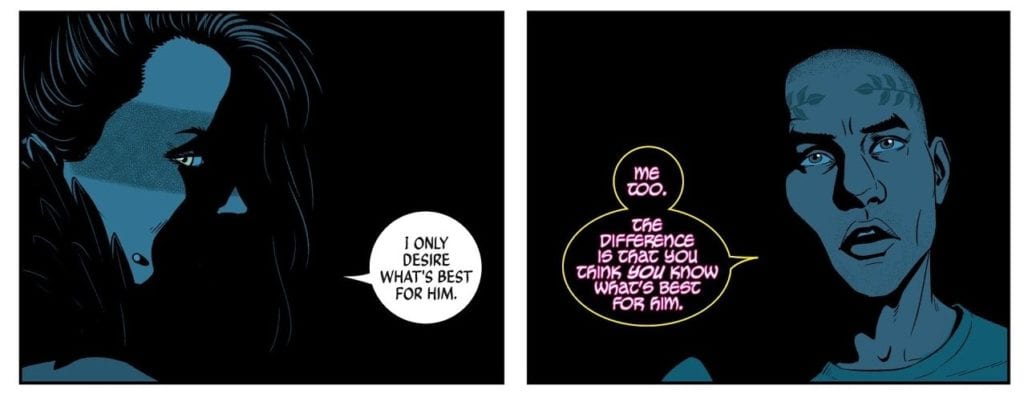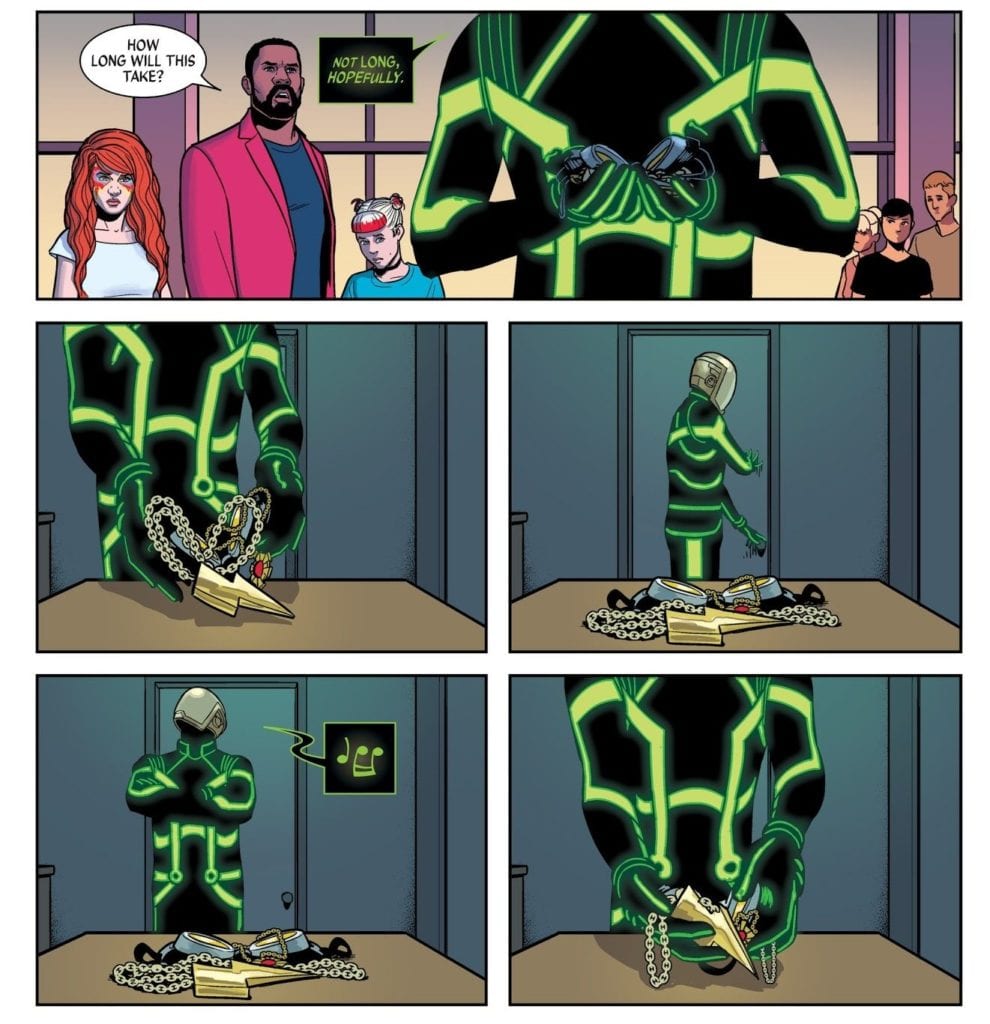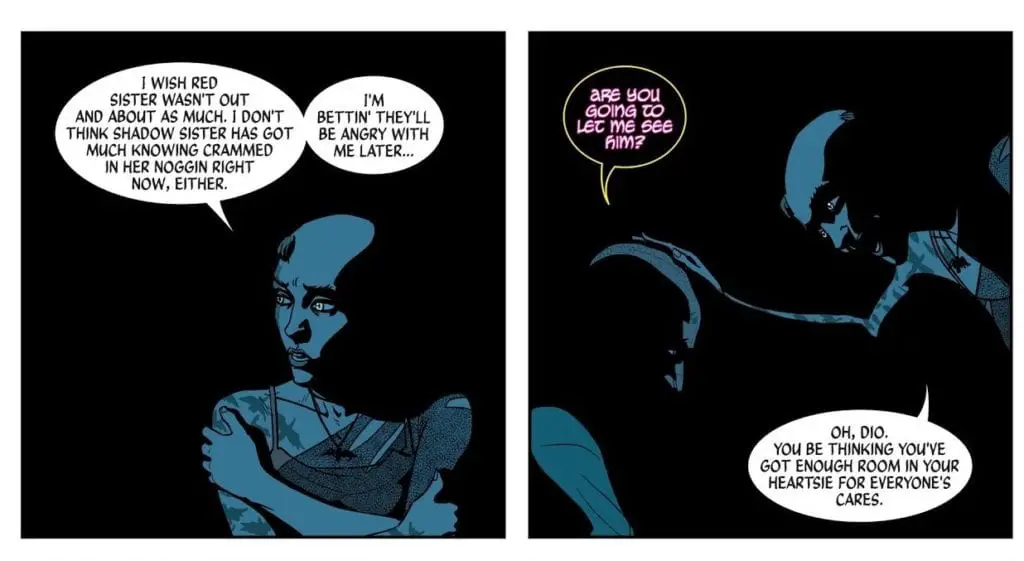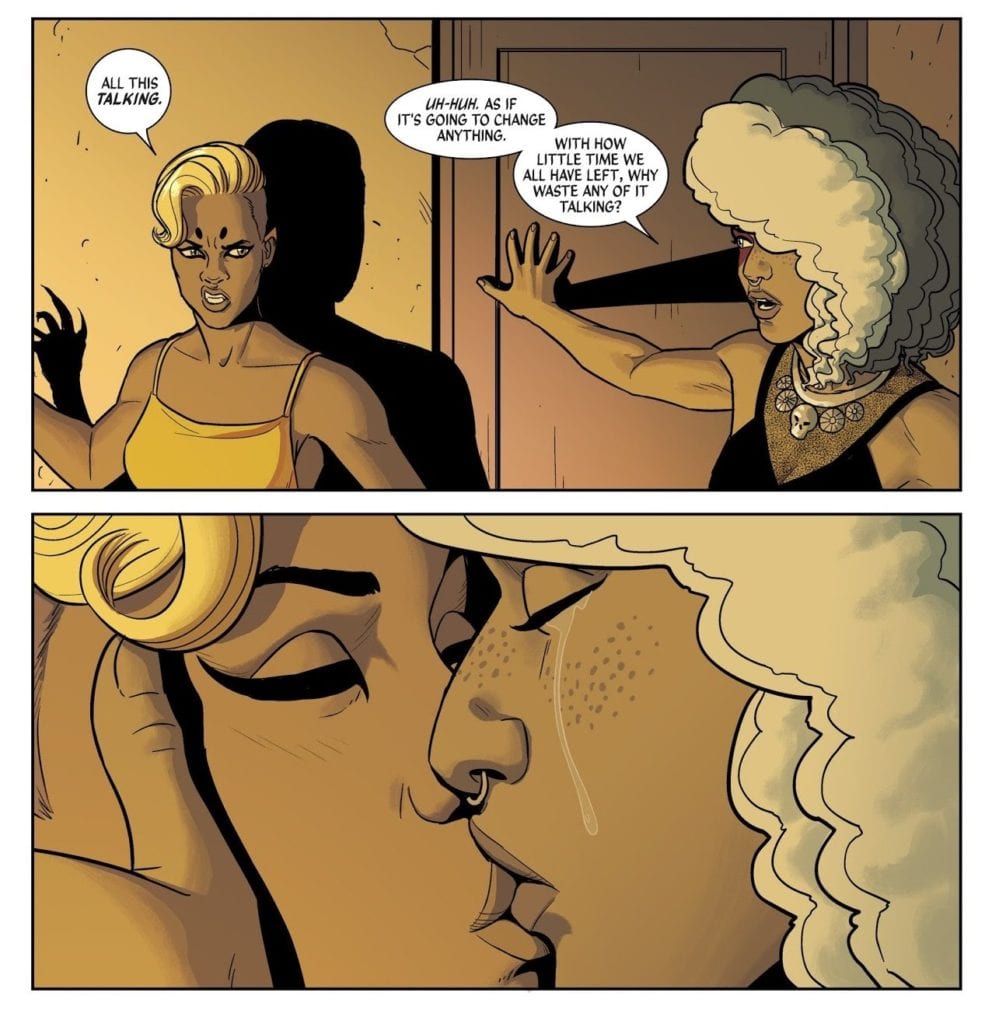We’re approaching the endgame supreme, lovelies. The players are all more or less in their places. All but a vital one, who has chosen to follow his heart and go to the Underworld for friendship’s sake. Sounds kind of Orpheus-like, doesn’t it?
Issue #30
“Beware the honest.”
The time spent below in the Underground last issue was draining. But although Persephone is free to mindlessly indulge in whatever she desires, the day isn’t over for Valhalla’s “R&D Department”. Woden, the Valkyries, and the non-Godly day workers have been busy preparing both the grand mysterious machine and Valhalla’s grounds for the upcoming gig.
Speaking of which, let’s do a quick recap of the specifics. Exactly 44,444 people in the grounds, ripe for Dionysus to pull his party hivemind thing, thus powering up the machine… and then see what happens. It’s a plan running entirely on uncertainty, both with regard to the gig actually containing the precise number of attendees and the outcome. A considerably more civil Woden assures Urdr the Valkyries can do crowd control if this event goes belly up.
But there is yet another concern on the preliminary side of things. Will Dionysus be around to do his thing? Urdr tells Woden Dio will make it. But this line straddles two possible senses: knowledge and desire. So, more uncertainty on our laps. Nothing quickens the pulse quite like uncertainty before some huge thing goes down, eh?

We find Dionysus sitting cross legged (a position conveying tranquil defiace) in the Underground. Right off the bat, we can say the scenario of waiting to be allowed to talk to Baphomet is something of a play in three acts. Obviously, each act will have Dio speak with Baphomet’s captor, the Morrigan, or rather each of her three personae. We begin Dionysus’ trials with The Morrigan’s more lucid side, her default goth queen personality. Despite her refusal to let Dio speak with Baph, she establishes some common grounds with the Wine God. They both want what’s best for those they care for. The Underworld Gods in this narrative have never actually been evil, not even Persephone. However, their fundamental difference from Dio is a matter of pure hubris.
Whereas Dionysus recognises that he doesn’t know what is best for everybody, the Morrigan thinks she does. Therefore, she declares that she will never allow Dionysus to speak with Baphomet. This doesn’t deter Dionysus from his attempt. In fact, a particular phrasing hints that his action doesn’t stem from a spontaneous decision, but an actual plan. The score so far: The Morrigan, 1; Dionysus, 0.
Meanwhile, at the Shard, Woden meets up with Baal, Minerva, and Amaterasu. What follows is something of an amusing means of ‘sweeping the rubbish under the carpet’ as Woden adds functionalities of tracking and recording to their gadgets. In truth, he does fuck all since he already did this ages ago. Woden’s dickishness has been considerably toned down since Persephone took him down to hell, but some of his entertaining features thankfully remain. At this time, he also remarks that he may have to create some pretty gadgets for the Goths if they show up. They’re basically the wild cards, the people who click maybe on a Facebook event, which can get annoying.

Back in the Underground, Dionysus continues to wait. The second trial of patience begins with a punt from The Morrigan’s second persona, the furious Badb Catha. She is not pleased at all that Dionysus would dare ‘disrespect her authority’ and judge her. In her infamous warlike fashion, Badb invites Dionysus to bring his crowd with him, for her to kill them all. His retort is a serene assertion of his efforts being only his own, which Badb takes offense to. So she has her birds claw and peck away, leaving him bloody. Once more, she leaves him declaring she won’t allow him to see Baphomet. Still, Dionysus waits. The score is now: The Morrigan, 2; Dionysus, 0. And his face probably hurts now.
We get an interlude of sorts in the story, courtesy of Instagram (or a legally-friendly stand in). On the one hand, we see the casual side of the Pantheon’s prominence in social media, despite the controversial recent events (as well as Amaterasu’s horrible taste in captions). On the other, we get the sense that Dionysus has been waiting in the Underground for a while. Soon enough, by the natural succession of threefold motifs and entities, we are now at Dionysus’ final trial. The Morrigan’s third persona, Gentle Annie has come to check up on him.
The relief in this scenario is palpable. Just check out Dio’s expression of a fond long-time-no-see. Some of this derives from the fact that Gentle Annie is, well, gentle; the security that she won’t harm Dionysus does play its part. But the main bulk of the sensation is Annie’s acknowledgement that she’s the part of Marian that doesn’t get to come out and play much anymore. That’s no surprise considering we’re this far into the Imperial Phase, where there appears to be little room for leniency and kindness. Nonetheless, Annie’s awareness of Badb and The Morrigan’s current states feels like a calling her full-self out on her latest actions. This truth about herself invites honesty towards Dio.

Gentle Annie is very concerned about Dio’s willingness to endanger himself for the sake of others. And she feels a sense of finality approaching. Thus, she bids her farewell to Dionysus (and perhaps to the readers as well), after which she grants him his wish, much to the anger and spite of her other selves. This is possibly what Dionysus intended all along, to chat with the one part of Marian that he could still reason with. As he would, Baphomet is quick to tell Dio how bad he looks.
Meanwhile, the mood grows tense as the Gods’ task force to capture Sakhmet comes to action after a sighting of the Cat Goddess. Minerva plays the Oracle to Baal and Amaterasu’s birds of prey, as they close in on Sakhmet.
However, before they catch Minerva’s command to abort, Baal crashes through a wall, ready to take his chances against perhaps the deadliest of the Gods. This turns out to be a waste of time, though. It was merely a girl who styled her attire after Sakhmet for the sake of an autograph. Anti-climatic as fuck, but still a good simulacrum. Yet again, as per the conventions of a narrative, an actual attempt at capturing Sakhmet may not go as smoothly. And then, we may return to this moment as a rueful retrospective.
Back to the boys in the dark. Baphomet is back in his usual pun-gent mood. But it no longer feels as right as it used to, not after seeing how badly his relationship with The Morrigan has decayed. By now, his wise-cracking has become a flagrant masquerade to hide the damage. Furthermore, when touching on the matter of the fine line between co-dependence and abuse, Baphomet tells Dionysus of the moment after his ascension. It was cool and all, until Baph realized he was made a God like The Morrigan, bound to live only for two years since. Although one could say he went ahead and presumed something else, Marian didn’t bother to bridge this communication gap before the deed was finished.

Therefore, Baphomet sees this relationship as an inescapable situation for Marian and he, perhaps from the very beginning. This is somewhat mirrored by Dionysus’ own situation, as he reveals he has feelings for Urdr, whose sexual orientation and current relationship status with her fellow Norns make a relation between them impossible. Such is life.
At the end of this heart-to-heart, Dionysus leaves a device in Baph’s hands, a means of communication in case he needs help. Although he doesn’t seem to care much for help now that things are reaching rock bottom, he may as well use it sometime in the issues to come.
Finally, bringing this issue to an end, The Morrigan pays Persephone a visit. Baph has told her the way, it seems, and she has a few words for the Destroyer. After ridding herself of the part that would forgive her (a dreadful implication for Gentle Annie), she delivers a threat for Persephone to stay away from her and Baphomet. Her tone turns cautionary as she warns Persephone of the things some people would do just to feel honest and clean.
Thus, Marian walks away, unaware that, though she came with the threat, she was the one in peril. Sakhmet was waiting to strike and kill just out of sight. Unbeknownst to the Queen of the Underworld, the Destroyer has just saved her life.

When questioned by Sakhmet on why she allowed The Morrigan to talk like that, Persephone says they’re too close to their inevitable doom for displays of vengeance and pride to matter. Finally, they share a kiss. Little does Sakhmet know or care, a furtive tear streams down Persephone’s face.
There’s no better way to portray a doomed, depressing romance. The Morrigan’s words may well apply in this case, somehow. It takes no more than common sense to know that there is a large difference between Sakhmet and Persephone. At this point, even one sliver of a conscience counts aplenty. Casting this statement as a reflection back on The Morrigan, one can only hope she hasn’t taken permanent leave of hers.
The Wicked + The Divine Issue #30 Credits
Writer: Kieron Gillen
Art / Cover: Jamie McKelvie, Matt Wilson

